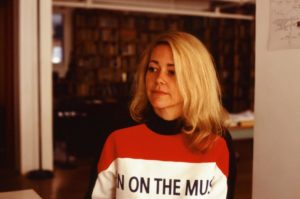
Q & A: Mezzo-Soprano Krysty Swann On Her Role Debut As Mayme in Ricky Ian Gordon & Lynn Nottage’s ‘Intimate Apparel’
By Jennifer PyronPhotographer credit: Dario Acosta
Mezzo-soprano Krysty Swann is currently performing the role of Mayme in “Intimate Apparel” at Lincoln Center Mitzi E. Newhouse Theater. The opera is one of Ricky Ian Gordon’s latest works and features a libretto by Pulitzer Prize-winner Lynn Nottage that is based on her play. The production officially opens on January 31st, after a two-year pause during previews because of Covid-19.
The intimacy of the theater, combined with Bartlett Sher’s direction, Jennifer Tipton’s lighting, and an outstanding cast, makes this new opera refreshingly unique and emotionally gripping.
OperaWire spoke with Swann about bringing the production to life, for her and the entire cast, and how the story can remind us about what it means for every voice to be heard, felt, and seen.
OperaWire: “Intimate Apparel” is like nothing I have experienced before as an opera and I’m curious about how you brought the role of Mayme to life. What can you tell us about your process?
Krysty Swann: I’ve longed for the opportunity to tap into Lynn Nottage’s story from the moment I first heard it, and not because of me or my technique or even my background. My work in “Intimate Apparel” is about processing this gorgeous story of multidimensional people—regular human beings—who return to what we do after two years off stage. Coming back to live performance is my process. Before the pandemic, I felt like I was on a drug. Then, when the stages went dark, I felt like it took away this drug from me. The grieving process I went through because of the loss of work was a new experience for me. It gutted me.
I feel that “Intimate Apparel” has helped me better understand this new experience surrounding grief and how to release my emotions through my work—because this is me and this is what I am here to do. When I first heard Ricky’s music, I fell in love. My voice knew the music before my brain could even think because I grew up with this kind of singing while listening to Sarah Vaughan, Judy Garland, Julie Andrews, Lena Horne, and Shirley Verrett. I fell in love with Ricky, too, and felt this connection to him because I’ve longed to sing a role like this, and it allows me to use all that I grew up loving about singing, and the production has also been an opportunity for me to make sure I balance my voice through jazz and opera techniques. I’ve learned how to blend all these ways of singing together for the role of Mayme and have returned to the drug that is singing for me.
I also feel like my family is part of this performance because when I told my Nana about Lynn Nottage, she was so excited. She has been following her work since the beginning and I feel a connection when I perform; it’s like all of my family and community are in this together. The story embraces you and us at the same time. I feel I am forever changed because I never knew an opera experience like this could exist.
OW: What are some of the deeper issues you feel this opera addresses?
KS: “Intimate Apparel” is an opera that speaks to people and lets them know they don’t have to suffer alone. I felt gutted when the pandemic began for everyone because this is what we, as artists, are here to do. We sacrifice everything to work and it doesn’t matter what role you play. There is beauty that comes when you realize this for yourself and your entire existence as a human being. I am grateful for our community and committed to our community. Every time I sing, I sing as though it’s the last time because who knows if we’ll have to cut it off again because of new Covid variants. All I can do is give everything I have during every performance I can give. We are all singing beautiful music and living these characters to their fullest capacity in this incredible staging.
OW: Do you remember where you heard Ricky’s music for the first time and knew Mayme was for you?
KS: I was originally referred to a 2015 workshop of “Intimate Apparel” where I heard the music for the first time and felt myself already knowing this role. Mayme made me want to do this because I fell in love with her character and the music right away. My repertoire is naturally geared towards Verdi, but I can also do Weill’s “Lost in the Stars,” so Ricky wrote music that uses my full instrument, and I recognized this from the start. Also, I could learn the music with Ricky in his apartment, and I felt like we were on the same page with all of it. I had been looking for a connection like this my whole life.
Preparing myself to live out the full story of Mayme was a fresh experience for me. She is very pragmatic and adaptable. She does what she needs to do, but I feel like she psychoanalyzes everything and knows what inevitably will go down. There is a confidence and fearlessness in her that I am still learning how to embrace myself. I had to give myself permission to be fully in this role and received a lot of support from Bart Sher and my colleagues in every scene. I have learned to pull from all the surrounding energies to fuel me. I am the oldest of four younger sisters, so I’m also tapping into that experience as Mayme. When I lost my mother and took over the responsibility of caring for my sisters, it instilled in me something that I am now tapping now as Mayme.
OW: I also really love the music and how the singers sound natural in their own voices. At times, I forgot it was an opera because I was so involved with Nottage’s story and Gordon’s music and how they blended together to create an experience that was not separate from anyone’s voice. “Intimate Apparel” comes from a very honest place and I feel this makes the opera extraordinarily refreshing. But there’s also an underlying tone of emptiness that resonated with me and stirred questions about each character’s perspective. It was like it left an insatiable longing intentionally unanswered because it is living with this emptiness that we all universally feel.
KS: Yes. This is why I have had my eye on “Intimate Apparel” since the beginning. The emptiness impacted me most because it’s what universally connects us all. I understood this so much more when I started learning the role of Mayme. It’s not that she means to do anything wrong, or that she makes choices to hurt anyone; she makes her choices from a place of thirst and emptiness. She gets tastes of relief here and there, but she doesn’t expect it to go away. Like a desert where you only get drops of water, this emptiness is the driving force that carries you forward and can never be satiated.
I watched my colleagues drop into this level of awareness too, and then this emptiness took on a whole new level of capacity. At that turning point, I decided to let my emotions out. I felt like there was an uprising inside of me that was too much, but that I had to learn how to release. It was like my body was figuring out how to follow what I already overloaded my brain with through the processing of these emotions. We can only hope that people feel this trauma as a message to reconnect and remember how we are all coming from this place of emptiness in our own way and how this helps us to come back together again.
OW: Do you feel “Intimate Apparel” will spark the interest of new audience members? What would you say about your experience when speaking with someone who has never been to an opera?
KS: Something like “Intimate Apparel” has not been done before. The amount of detail and scene work we did directly with Bart Sher really sets us up for a thoughtful performance. We took the time to hone in on the bits and pieces of Lynn Nottage’s story and Ricky Ian Gordon’s music to make this new opera accessible to a wide range of audience members.
Just the other day, I was speaking with my Uber driver about “Intimate Apparel” and how important it is to shift the perspective of opera-goers back to remembering what opera is for and how it’s for everyone; it has never been for just one group of people. This piece can help us remember that. Ricky has this incredible way of fusing the English language with musical themes that become a musical story for everyone. There are also elements of each one of Lynn Nottage’s characters that I can relate to on some level.
You will see moments in the story that you know as your own. I can even relate to Mrs. Van Buren’s character because I know the history of this time period and I know what the social issues were. But most importantly, it is at a deeper level that I empathize with her and what she goes through as a woman. Her pain is like Mayme’s pain and Mayme’s pain is like Esther’s pain. These women then lock in together to create a moment for women to feel heard and understood. This then becomes a universal theme, which is the sign of good writing and music. I tell people, this opera is for you. This opera is for you and this is how opera can be for you.
I think the uniqueness of “Intimate Apparel” begins at the root of how this opera began with opera singers in mind and has stayed focused on honoring their natural voices. No one is expected to modify their technique because it is an opera and this is how opera can become more organic. I think this is a perfect beginner’s opera to see for anyone.



